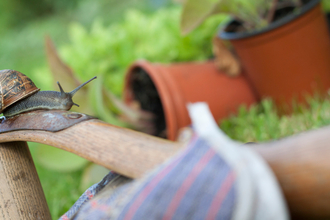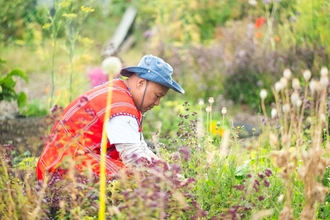Essex housing estate is nurturing its community and nature
Local residents repurposed materials like these tyres to create planters and other garden features. Photo credit: Essex Wildlife Trust
Coming home and watering the garden calms me down, because I have a stressful job, it helps with my mental health.
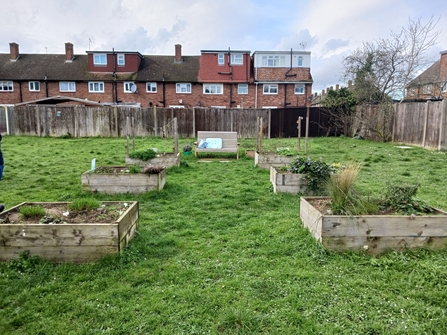
The community space is a great place to relax and unwind or connect with others over gardening. Photo credit: Essex Wildlife Trust.
Background
Residents of Clayburn Gardens, a housing estate in Essex, were keen to bring the community together and improve their communal green space with a new garden.
Although the community was friendly with each other, there was very little interaction between neighbours. One resident said they would wave and say good morning, but the community spirit ended there.
Residents decided to take matters into their own hands. They got in touch with the Resident Engagement Housing team at Thurrock Council and asked for gardening facilities to be installed in the communal space.
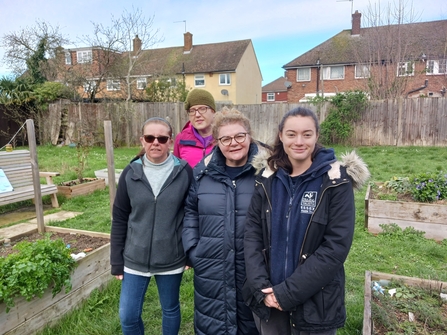
Residents of Clayburn Garden with Maya Harvey-Mills of Essex Wildlife Trust. Photo credit: Essex Wildlife Trust.
Getting the project off the ground
At the residents’ request, the council installed raised beds, a greenhouse, compost bins and a wormery. Two of the beds are used to grow vegetables, one grows herbs and three are home to pollinator-friendly plants.
The council also connected the group with Essex Wildlife Trust who provided additional support and advice.
The same individual who asked the council for equipment also asked Forestry England to supply 200 saplings to plant a hedgerow.
In April 2023 a group of residents came together to launch the community garden project with a hedgerow planting event, inviting everyone from the estate through leafletting.
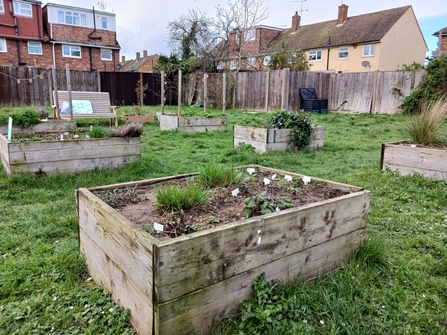
Photo credit: Essex Wildlife Trust.
Support and progress
With the infrastructure installed by the council, a committed group of around six people continued maintaining Clayburn Gardens, growing vegetables and feeling empowered to rewild areas. This includes a stunning wildflower meadow planted by the residents.
Checking back in with Essex Wildlife Trust later in the year, the group requested regular meetings to benefit from the Trust’s advice, including guidance on how to provide an area for hedgehogs to live.
The Trust’s new Wilder Communities Officer, Maya helped the group develop ideas including a homemade hedgehog hotel, creating habitats such as leaf and stick piles and installing a log pile.
Meanwhile, the Trust’s Wilder Community Organiser, Helen went along to the hedge planting day with resources including spotter sheets as a conversation starter. She was able to talk to attendees about the sort of wildlife seen in the area, neighbourhood issues such as dog fouling and local opinions on the garden ambitions.
Challenges
Sadly, it was found that the hedge planted in spring had been cut down by council contractors in late 2023. The area where saplings were planted had been mowed. This was a blow to the group, but options are being explored for replacing the hedgerow.
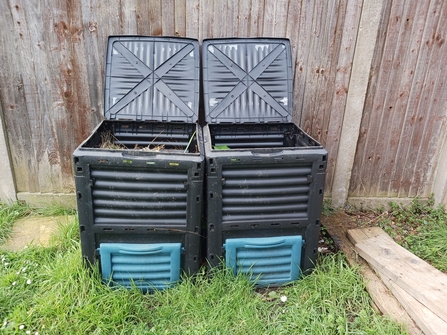
The group make their own compost at the gadren. Photo credit: Essex Wildlife Trust.
The word has spread
The initial spring planting event was a real success and inspired residents opposite the Clayburn estate. The Trust is now supporting them to develop and deliver a similar project (if this is what the community wants to do!).
The garden has had lots of benefits for people and wildlife alike. Residents have seen an increase in insects including bees, butterflies and ladybirds around the flower meadow. Other wildlife spotted in and around the garden include smooth newts, hedgehogs, foxes, muntjack, owls, woodpeckers, jays, sparrow hawks, small songbirds, magpies, grey squirrels and badgers.
The vegetables and herbs, meanwhile, are eaten by residents, helping them save money on their food shop. All the while, a sense of community is forming around the garden. Friendships are being made between neighbours between neighbours and it’s having a positive impact on people’s wellbeing.
One member of the Clayburn Community Garden Gardening Group said: "Coming home and watering the garden calms me down, because I have a stressful job, it helps with my mental health.”
Next steps
In addition to a corner of the garden being dedicated to hedgehogs, the group is now thinking about creating a safe space for newts, which have also been spotted around the estate.
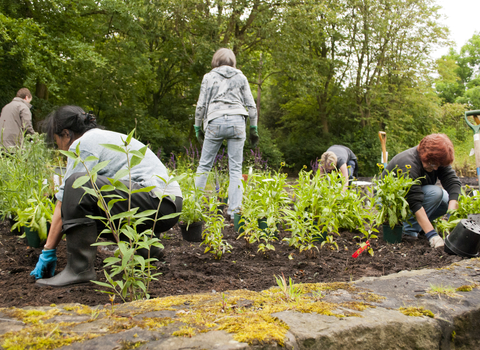
Katrina Martin/2020VISION
Have you been part of a community garden?
If you want to tell us your story, we'd love to hear from you and share your experience on the Community Hub.

